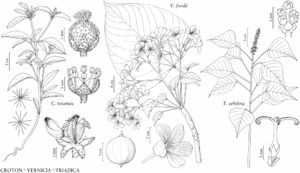Difference between revisions of "Vernicia fordii"
Kew Bull. 20: 394. 1967.
FNA>Volume Importer |
imported>Volume Importer |
||
| Line 40: | Line 40: | ||
|elevation=0–150 m. | |elevation=0–150 m. | ||
|distribution=Ala.;Ark.;Fla.;Ga.;La.;Miss.;N.C.;S.C.;Tex.;se Asia;introduced also in Australia. | |distribution=Ala.;Ark.;Fla.;Ga.;La.;Miss.;N.C.;S.C.;Tex.;se Asia;introduced also in Australia. | ||
| + | |introduced=true | ||
|discussion=<p><i>Vernicia fordii</i> was cultivated for its seed oil in plantations along the Gulf coast from Florida to Texas from the 1920s to the 1960s. Although no longer commercially cultivated in the southeastern United States, it is naturalized there and is now listed as an invasive weed in Florida. All parts of the plant are poisonous; seeds have strong purgative properties and may cause poisoning if eaten.</p> | |discussion=<p><i>Vernicia fordii</i> was cultivated for its seed oil in plantations along the Gulf coast from Florida to Texas from the 1920s to the 1960s. Although no longer commercially cultivated in the southeastern United States, it is naturalized there and is now listed as an invasive weed in Florida. All parts of the plant are poisonous; seeds have strong purgative properties and may cause poisoning if eaten.</p> | ||
|tables= | |tables= | ||
| Line 64: | Line 65: | ||
|publication year=1967 | |publication year=1967 | ||
|special status=Weedy;Introduced;Illustrated | |special status=Weedy;Introduced;Illustrated | ||
| − | |source xml=https:// | + | |source xml=https://bibilujan@bitbucket.org/aafc-mbb/fna-data-curation.git/src/bb6b7e3a7de7d3b7888a1ad48c7fd8f5c722d8d6/coarse_grained_fna_xml/V12/V12_626.xml |
|genus=Vernicia | |genus=Vernicia | ||
|species=Vernicia fordii | |species=Vernicia fordii | ||
Revision as of 21:11, 27 May 2020
Trees, to 10[–20] m. Leaves: stipules 4–12 mm; petiole 6–22 cm, with pair of round, sessile, cushion-shaped glands at apex; blade broadly ovate or triangular-ovate, 10–25 × 8–20 cm, usually unlobed, sometimes shallowly 3-lobed, base cordate, truncate, or rounded, apex acuminate, both surfaces moderately to sparsely hairy, hairs appressed. Inflorescences 6–15 × 6–20 cm, often branching from near base, branches to 15 cm. Pedicels 1–2 cm. Staminate flowers: sepals green to purplish, 10–12 mm; petals white or pale pink with dark pink to red veins proximally, sometimes yellow basally, obovate, 25–35(–40) × 15–20 mm, narrowed at base; nectary glands awl-shaped to strap-shaped; stamens in outer whorl 8 mm, in inner whorl 13 mm, connate 1/2–2/3 length. Pistillate flowers: sepals and petals as in staminate flowers; ovary hairy. Capsules subglobose, 4–6 cm diam., smooth, glabrous or glabrate, short stipitate, apex apiculate. Seeds 2.5–3 × 2 cm, surface warty, ridged. 2n = 22 (China).
Phenology: Flowering Mar–Apr; fruiting Apr–Aug.
Habitat: Wood and field margins, abandoned fields, roadsides, disturbed woods.
Elevation: 0–150 m.
Distribution
Introduced; Ala., Ark., Fla., Ga., La., Miss., N.C., S.C., Tex., se Asia, introduced also in Australia.
Discussion
Vernicia fordii was cultivated for its seed oil in plantations along the Gulf coast from Florida to Texas from the 1920s to the 1960s. Although no longer commercially cultivated in the southeastern United States, it is naturalized there and is now listed as an invasive weed in Florida. All parts of the plant are poisonous; seeds have strong purgative properties and may cause poisoning if eaten.
Selected References
None.
